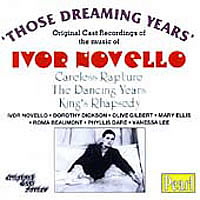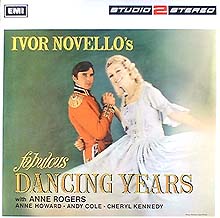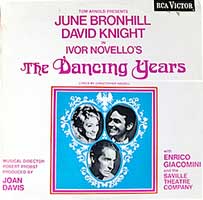The Dancing Years

(Revised Version)
Lyrics by Christopher Hassall : A new version for the theatre adapted by Cecil Clarke and Tom Arnold. First produced for television 27 August, 1981
The Dancing Years was first produced at the Theatre Royal, Drury Lane, in March, 1939, and became one of Ivor Novello's best-loved musicals, playing almost continuously for a decade.
Summary
Cecil Clarke's adaptation for television has been used as the basis for the current revised version. While retaining all the well-known musical numbers, it allows a more fluid production, no longer dependent on major scene changes, and, by omitting scenes incidental to the main plot, has concentrated on the central love story between penniless, unknown composer, Rudi Kleber, who leaps to fame in Vienna of 1911, and the operetta star who first befriends him, Maria Ziegler.
Story
Act I
Rudi Kleber is a composer, one of the great unplayed and therefore one of the decidedly penniless, and he and his piano board at an inn just outside Vienna where his tardiness with the rent money is a perpetual bone of contention between him and his landlady. For six months she has fed and lodged him without a pfennig of payment and now she has had enough. Returning from a night-time jaunt up the nearby mountains to pick moon-blossoms with the landlady's adoring teenage niece, Grete, he finds his piano in the inn's front garden. He has been evicted and, to pay his debt, the piano has been sold to a nearby dealer who is coming in a few hours to take it away.
 While the disconsolate Rudi wonders how he will raise the money to avoid losing his precious piano, the very early morning breakfast crowd is heard approaching: a group of officers and their ladies who have been partying all night and who have come to clear the fumes with a healthy breakfast. Rudi sees the chance of earning a little money by playing his compositions to the aristocratic company while they eat and, when his first waltz attracts their praises, he starts a competitive auction for its sale. The auction is cut short when all the bids are largely topped by an offer from a late arrival, the operetta star Maria Ziegler. The tune is just what she needs as an interpolated number in her new show and, while breakfast is served, she sings 'her' song to Rudi's accompaniment.
While the disconsolate Rudi wonders how he will raise the money to avoid losing his precious piano, the very early morning breakfast crowd is heard approaching: a group of officers and their ladies who have been partying all night and who have come to clear the fumes with a healthy breakfast. Rudi sees the chance of earning a little money by playing his compositions to the aristocratic company while they eat and, when his first waltz attracts their praises, he starts a competitive auction for its sale. The auction is cut short when all the bids are largely topped by an offer from a late arrival, the operetta star Maria Ziegler. The tune is just what she needs as an interpolated number in her new show and, while breakfast is served, she sings 'her' song to Rudi's accompaniment.
Some days later, Maria returns to the inn bringing with her the Prince Charles Metterling, an old and close friend and sometime lover. She wants him to use his influence with the theatre managers of Vienna to get Rudi a commission as a composer, and she is also asking him to allow the young man to live in an empty studio at his home. Charles is not at all enamoured of the idea, but he cannot refuse Maria anything and so it is agreed that Rudi will leave the inn and be installed at the Palais Metterling where he can take, in comparative comfort, the first steps towards a career.
In all the excitement of his new adventure Rudi cannot know that there is a heart which is being broken. Little Grete is losing her friend and she cannot bear it. With all the despair of her fifteen years she knows that she will die if Rudi goes away. He takes her in his arms and listens to her heartfelt words of devotion, and she is only calmed when he lovingly agrees that he will never ask anyone else to marry him until she is grown up and he has first seen if he would like to ask her. She knows that she may grow up to be perfectly awful, but she must have the chance. When he leaves she does not cry, for she has his promise and she feels safe.
A month later things have developed in a not unexpected way. Maria is falling in love with Rudi. Prince Charles is aware of the situation but he hides his discomfort under sarcastic teasing, particularly when Ruth attempts disastrously to become a Viennese gentleman and to dress himself in what he conceives to be the fashion of the town. Maria confides her growing feelings to her teacher, Frau Kurt, as they join in a duet from Rudi's score to the operetta in which Maria is to star.
At the first night of the new operetta, gossip is aflame about the new composer and the prima donna.. Prince Charles pours scorn on the gossips and proudly confirms that Maria will sup with him after her premiere as she has always done but, as the curtain rises for the last act, he receives a message: the lady begs to be excused. On the stage of the Theater an der Wien, Rudi Kleber's operetta Lorelei climbs unstoppably to success as Charles's star equally inexorably declines.
In Maria's apartment, after the show, Rudi is a little drunk with wine and success, but also with feeling. He asks Maria if she loves him as he loves her and she answers whole-heartedly, yes. He asks about Charles, and Maria assures him that the affair between them was over long ago. As the lovers kiss, Charles enters. With pointed charm he congratulates Rudi on both his successes. He is going to England, so he has come to collect his clothes: his dressing gown which Rudi is wearing and his other things which he remembered when he was here last night.
Charles was here, in Maria's rooms last night? Maria cannot deny the truth of his words and to the bewildered Rudi it seems that Maria has lied to him. In a turmoil of wine-stained emotion he leaves the apartment, leaving Maria and Charles together. Tearfully Maria taxes Charles with destroying the first real love of her life and the Prince, his own cause equally destroyed, departs. But Rudi has overheard Maria's profession of love and he returns. Maria tells him that Charles had indeed been there the previous night: to ask her to wed him, or to say goodbye. It was goodbye. As the two lovers embrace to the strains of 'I Can Give You the Starlight', the act ends.
ACT 2
It is three years later, 1914, in a chalet in the Tyrol. Much has happened in the intervening time. Rudi has become internationally known, and he and Maria have lived happily together, but through all that time he has not asked her to marry him. He remembers his vow to little Grete, now in school in England, and he will neither break it nor betray it.  Maria feels deeply the socially unacceptable position she is in and she cannot help being hurt by Rudi's reticence where marriage is concerned. There is no doubting his love, though. It shines through his music for her, and tells her in its words what he cannot yet say to her more clearly.
Maria feels deeply the socially unacceptable position she is in and she cannot help being hurt by Rudi's reticence where marriage is concerned. There is no doubting his love, though. It shines through his music for her, and tells her in its words what he cannot yet say to her more clearly.
Grete returns to Austria, no longer a schoolgirl but a beautiful young woman. Rudi's friend Franzel is love-struck, and Rudi himself is delighted to have his little girl back. Maria is less delighted. She is jealous, and before long a quarrel born of that jealousy builds up. He storms out and she pens a note to the still faithful Charles Metterling. The quarrel is soon mended, but the note cannot be recalled. When Charles arrives, Maria pours out her troubled heart to him. The nature of her relationship with Rudi keeps her in a perpetual state of tension and the advent of Grete has brought those tensions to an unbearable pitch.
Grete entertains the artists gathered in the house for a gala performance with a little English musical comedy song but, when she has finished, Maria asks Rudi to send everyone away. She can take no more and she must speak to him alone. Rudi asks her to wait upstairs for five minutes. Now he can fulfil his promise to Grete. She will be the first woman to receive an offer of marriage from the great Rudi Kleber. She will refuse, of course, but what a triumph it will be.
Rudi does it properly, bended knee and all and, as he does so, Maria, standing quietly in the shadows on the stairs', listens. Without waiting a moment longer, she leaves the house in distress and so she does not hear the rest of the scene: Grete's delighted refusal which at last leaves Rudi free to ask Maria to marry him. When Grete goes out of the room, he plays the refrain of 'My Dearest Dear', the agreed cue for Maria to come downstairs. But she does not come. She has gone.
ACT 3
The next morning rehearsals for the concert continue as Rudi worries over Maria's disappearance. Soon she returns, to flamboyantly give her congratulations to Rudi and Grete and to break her own news: she has married Charles Metterling this morning. Now, when she hears the truth, it is too late.
Twelve years later, Rudi and Maria meet accidentally in a restaurant. Nothing has changed in their fierce feeling for each other. He has been hugely successful, she has become a figure in society, and they are both wretched. She promises to come to see him in a week's time, and then he shall decide what to do. When she comes, the reason for her postponement of the decision is made plain. She brings with her a little boy, her son, twelve years old.
He is Rudi's son. Charles knows this, but he has brought up the boy as his own child. If she is to leave Charles and go away with Rudi, the boy's world will be shattered. They cannot do it. As Maria leaves to return to her glittering, soulless life, Rudi once more plays 'My Dearest Dear', the song which represents both their love and their parting.
They will meet again, however. When war strikes Austria and Rudi Kleber is imprisoned for helping refugees to escape, the Princess Metterling is able to use her influence to effect his release. The dancing years are far behind them in this new world and the future, whatever it may be, will be for their son.
Adapted from Gänzl's Book of the Musical Theatre
The Cast
Singing principals: Maria; Cäcille, her mentor, Grete; Ceruti, a tenor
Straight roles:
- Hattie, guest-housekeeper
- Countess Lotte
- Rudi
- Prince Charles Metterling
- Franzel, a young officer
- Carl, Maria's 12 year old son.
In addition there are numerous smaller roles as well as a large chorus.
The Scenes
SS headquarters in Vienna, a beer garden, Maria's drawing-room, the Theater an der Wein, a schloss garden, the Gala, Locher's restaurant
NB: Staging for this adapted version has been greatly simplified and the sets left very much to the individual director and the resources available
Musical Numbers:
- Dawn Prelude
- Uniform
- Waltz of My Heart
- 'The Wings of Sleep
- Lorelei
- My Life Belongs to You
- I Can Give You the Starlight
- I Can Give You the Starlight - Reprise
- My Dearest Dear
- Primrose
- My Dearest Dear - reprise
In Praise of Love - The Leap Year Waltz
- My Dearest DearReprise